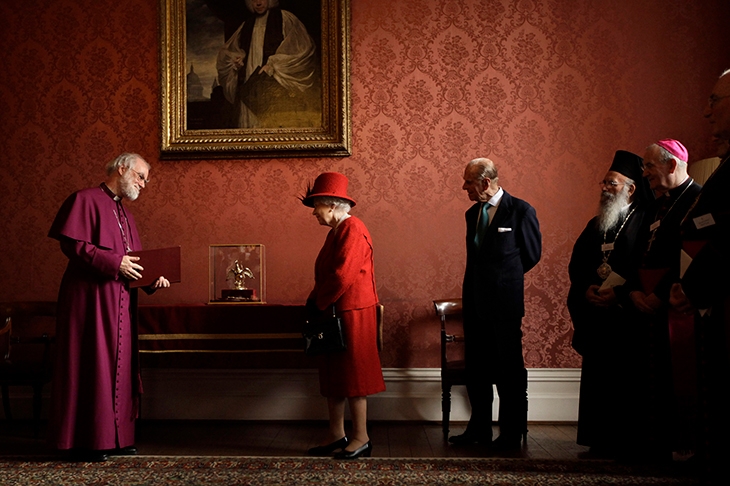The recent Sewell report on Race and Ethnic Disparities has been much abused and little read. It is full of interesting suggestions, however. One, emphasising the shared history of modern Britain, is to compile ‘a dictionary or lexicon of well-known British words which are Indian in origin’. Actually, such a work already exists. It is called Hobson-Jobson, ‘a glossary of colloquial Anglo-Indian words and phrases, and of kindred terms, etymological, historical, geographical and discursive’. Edited by Colonel Henry Yule, Royal Engineers, and Dr A.C. Burnell, of the Madras Civil Service, it was completed in 1886. It is a large, fascinating book, half an hour in whose company is never wasted. Well-known words that feature include atoll, avatar and ‘a muck’ (which we nowadays spell ‘amok’, and was not, say the editors, originally Malay); bamboo, bangle and bazaar; caddy, candy and cash; and so on down the alphabet. In some areas, the Indian influence is almost pervasive — e.g. calico, chintz and gingham. I like this entry: ‘Home: In Anglo-Indian and colonial speech this means England.’ The book’s curious title derives thus: ‘Hobson-Jobson: a native festal excitement… an Anglo-Saxon version of the wailings of the Mahommedans as they beat their breasts in the procession of the Moharram — “Ya Hasan! Ya Hosain!”’ A modern version of this masterpiece would be most welcome.
Of all the many articles written about the Duke of Edinburgh, the best was Jeremy Clarke’s Low Life column last week. It praised the manner of Prince Philip’s annual salute when laying the wreath at the Cenotaph. What made it almost spookily brilliant was that Jeremy wrote and published it before the Duke had died. So I feel shy about writing more, but here is a word about Prince Philip and religion. As a boy at Eton from 1969, I was invited to conferences at St George’s House, Windsor. These had been established by the Duke in 1966. They examined religious issues from a non-denominational point of view and attracted distinguished thinkers. They were open-minded and quite groovy. I recall a clergyman playing and expounding Leonard Cohen’s ‘Suzanne’ to us. Perhaps Prince Philip liked its line: ‘He [Jesus] said all men will be sailors then until the sea shall free them.’
In 1982, the Duke sent a copy of a lecture ‘Evolution from Space’, given by the cosmologist Sir Fred Hoyle, to Michael Mann, Dean of Windsor and overseer of St George’s House. This began an exchange of letters eventually published as a short book, A Windsor Correspondence. It reflected Prince Philip’s questioning mind and practical approach. Where Mann is wordier and more theological, the Duke presses on, arguing the compatibility of God and evolution and impatient with the old debate about faith vs works: ‘Frankly I cannot see any criterion for acceptable actions unless they are based on Christ’s teaching which I understand to be intended to benefit future generations. I would prefer to follow his teaching because I am convinced that it is right, rather than a means of getting a better deal in Heaven.’ One can imagine him making this point to St Peter right now, not seeking any special favours, just hoping for the best.
Jesus College, Cambridge does not want to talk to the press either about its pro-Chinese Communist party China Centre and UK-China Global Issues Dialogue Centre, or its campaign to remove the Grinling Gibbons memorial of its benefactor Tobias Rustat from its chapel because of his slavery connections. (The Rustat project necessitates a contested, expensive ecclesiastical court case to get rid of it.) So I am doing a bit of Kremlinology on the latest issue of Jesuan News, which is sent to alumni. In her letter (‘Dear Jesuan’), the Master, Sonita Alleyne, half admits that getting rid of this beautiful monument is proving difficult. ‘I am pleased that our process has not been rushed,’ she says, and subtly distances herself from it: ‘It started before my time… The final decision, quite rightly, lies with the Church of England.’ As for China — which has far, far greater links with slavery than poor old Rustat — an anonymous article defends the China Centre, run by the pro-communist Professor Peter Nolan. ‘The events represent a wide range of views,’ it asserts, although no sustained examination of Beijing’s treatment of the Uighurs or Hong Kong has ever featured among them. But it adds that the Dialogue Centre is ‘broadening its brief to encompass global issues more widely’, so ‘the Centre’s name was shortened to the Global Issues Dialogue Centre in March 2021’. Perhaps the college now realises its mistake, in 2018, in taking start-up money from China’s National Development and Reform Commission. So now the word ‘China’ has been dropped, a surreptitious relaunch.
‘We’re not an island. We are part of something far, far bigger,’ say the enraging HSBC adverts which still pop up on television. The bank is telling the truth about itself at least: it is now effectively part of something far, far bigger than this island — China.
Shirley Williams was all the mostly nice things the obituaries mention — kindly, moderate, unpompous, disorganised and inveterately late. She is in that interesting category of politicians who were unsuccessful, yet made a difference. But I fear I can never stop thinking of an incident in Crosby, the constituency which, as SDP candidate in the famous by-election of 1981, she won. It was a rare English seat where the local population was predominantly Catholic. She was Catholic too, though divorced. Seeking to please, she went to Mass twice on Sundays in the campaign and received the sacrament at both Masses, which is against custom. Auberon Waugh spotted this, and christened her Shirley ‘two wafers’ Williams, in this paper. So she has remained in my mind ever since.







Comments